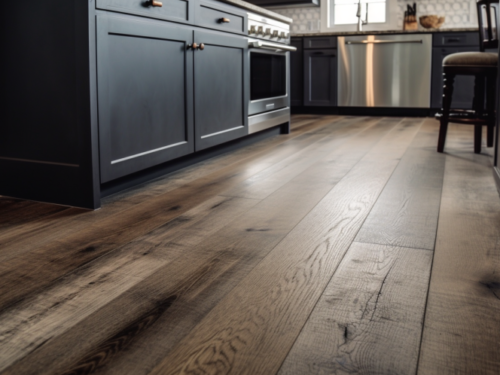
What type of hardwood floor doesn’t scratch?
Hardwood floors are beautiful, timeless, and add value to your home. However, one downside of these floors is that they can scratch easily, which can be frustrating for homeowners.
That being said, it’s important to choose the right type of hardwood flooring that is durable and won’t scratch easily. But what type of hardwood floor doesn’t scratch — if any?
Let’s talk about it.
Hardness Ratings for Hardwood Flooring
The hardness rating of a hardwood floor is measured by the Janka scale, which tests the resistance of the wood to wear and tear. The higher the rating, the more resistant the wood is to scratches and dents. The Janka scale ranges from 0-4000, and the most durable hardwoods have a rating of 3000 or higher. Popular choices for high Janka ratings include Brazilian Walnut, Santos Mahogany, and Brazilian Cherry.
Related Content: Can you have solid wood flooring in a kitchen?
Engineered Hardwood Flooring
Engineered hardwood flooring is made by layering hardwood planks on top of each other and gluing them together under high pressure. This type of flooring is more resistant to scratches and dents because it’s made of a multi-layered construction. The top layer is hardwood and is the most durable, which means that it will hold up to wear and tear over time. However, it’s important to choose a good quality engineered hardwood floor with a high-quality finish because if the top layer scratches, it can expose the lower layers, which can be prone to scratching.
Choosing a Finish
When choosing a hardwood floor, the finish is just as important as the type of wood because it will affect the durability of your floor. Opt for a finish that is resistant to scratches and dents. A popular choice is a high-gloss finish because it’s durable and can resist scratches. However, it can be prone to scuffs and marks, which can be more visible on a shiny surface. A good alternative is a matte or satin finish, which is more forgiving when it comes to scratches and can hide imperfections better.
Related Content: What is the most popular hardwood flooring right now?
Regular Maintenance
Even the most durable hardwood floors can scratch if not properly maintained. Sweeping or vacuuming your floors regularly can help get rid of dirt and debris that can lead to scratches. It’s also a good idea to put protective pads under furniture and avoid dragging heavy items across your floors, as it can cause scratches and dents. When cleaning your floors, opt for a pH-neutral cleaner that won’t leave any streaks or marks.
Related Content: Is carpet cheaper than hardwood?
Additional Tips
Choosing a hardwood floor that’s resistant to scratches is just one factor to consider. Other factors to keep in mind include the color, texture, and natural characteristics of the wood. A lighter-colored floor can show scratches more easily, but textured wood can also hide imperfections better. It’s also important to choose a reputable manufacturer that stands behind their products and offers warranties for their hardwood floors.
Choosing the right hardwood floor is crucial if you want to create a beautiful and durable space in your home. In this blog post, we’ve discussed what type of hardwood floor doesn’t scratch and what to look for when choosing your perfect floor. Hardwood floors with high Janka ratings, engineered hardwood flooring, and finishes that are resistant to scratches are great options to consider. Remember to also properly maintain your floors and choose a reputable manufacturer to ensure that your floors last for years to come.


